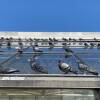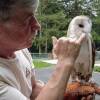Wild turkeys are native to Massachusetts; Benjamin Franklin famously proposed the plump ground birds over the bald eagle as a national symbol for the fledgling nation. But in 1851 the last known native bird was killed, and in the 1970s biologists at MassWildlife began efforts to repopulate the bird in the state.
But they didn’t start comprehensively measuring the fruits of their labors until the 1990s when they launched the Wild Turkey Brood Count.
Today they are everywhere, with an approximated 35,000 turkeys from the forests of Eastern Massachusetts to the narrow streets of Somerville and Boston.
Around this time of year, turkeys breed and hatch new poults. From June 1 to Aug. 31, the Massachusetts Division of Fishery and Wildlife wants residents' help counting as many wild turkeys as possible.
Data from the annual Turkey Brood Survey allows scientists to estimate productivity, reproductive success and fall harvest potential among Massachusetts’ wild turkey population.
David Scarpitti, turkey and upland game project leader at MassWildlife, told GBH News that the survey has gained popularity among the general population in Massachusetts.
“It’s a really popular survey, the response rate is really quite high, it provides a really useful source of data for us,” Scarpitti said.
Mass Audubon's Director of Important Bird Areas Wayne Petersen told GBH News of the importance of ways that the information could be used by MassWildlife officials.
“The turkeys may have a very productive nesting season and then be lots of broods, and then in other years for whatever the reasons they may be less successful. So that's how over time they begin to track what the population is doing,” Petersen said.
The Turkey Brood Survey is not only used to count how many turkeys Massachusetts has. According to Scarpitti, scientists like him and others at MassWildlife also track the lifespan of poults from the beginning to the end of the summer.
“So you have these very small turkeys on the landscape; they're really quite vulnerable to predation and to all sorts of other factors that cause mortality,” Scarpitti said, “What we see is that by the end of the summer when they're about 3 months old those birds are pretty grown, they're pretty capable, so if they survive that three-month period, that gauntlet of those three months, they're probably going to survive well after.”
Turkeys are habitual and social birds, for the scientists at MassWildlife, it is almost impossible to avoid double counting some wild turkeys.
“When you fill out the form there is a section that just says, ‘do you believe that you've seen this group of turkeys before?’” Scarpitti said.
The Turkey Brood Survey can be found on the MassWildlife website.
Have you spotted turkeys in your neighborhood? Share with us @GBHnews.
They grow up so fast! The baby turkeys you can barely see scuttling through the grass in this May 25 video have already lost nearly all their fluff. @GBHNews pic.twitter.com/xmz6haJSRY
— Lisa Wardle (@LisaJWardle) July 8, 2022
This was yesterday in Johnston RI
— Missy (@MichelleDelNigr) July 9, 2022
I had pulled over to watch them. The video gets a little crazy towards the end because a car was coming & I was trying to signal to the driver to stop 🦃🦃https://t.co/BJMum7Pxlr








